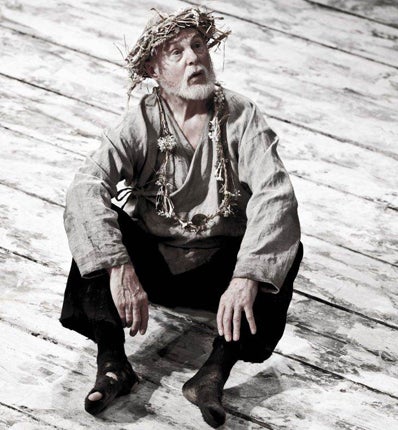First Night: King Lear, Donmar Warehouse, London
Jacobi's Lear is too calm, not enough storm

Your support helps us to tell the story
From reproductive rights to climate change to Big Tech, The Independent is on the ground when the story is developing. Whether it's investigating the financials of Elon Musk's pro-Trump PAC or producing our latest documentary, 'The A Word', which shines a light on the American women fighting for reproductive rights, we know how important it is to parse out the facts from the messaging.
At such a critical moment in US history, we need reporters on the ground. Your donation allows us to keep sending journalists to speak to both sides of the story.
The Independent is trusted by Americans across the entire political spectrum. And unlike many other quality news outlets, we choose not to lock Americans out of our reporting and analysis with paywalls. We believe quality journalism should be available to everyone, paid for by those who can afford it.
Your support makes all the difference.He is the most exacting and pernickety of actors, Derek Jacobi, which means that his long-awaited Lear will never open the floodgates. There's something guarded and "worked out" about it, but it is most beautifully spoken and detailed. It's also terribly polite.
Cradling the dead Cordelia, he comments on her voice being ever soft and low – then skips the phrase about "an excellent thing in a woman" – so as not to frighten the horses. And his poor Fool, he says, is dead, not "hanged". There's a lot of editing going on, some of it effectively structural in the second half. But you start to yearn for the world to break apart as hearts crack.
Jacobi completes a personal journey from Scrooge in the television adverts, back to Cadfael the monk, padding around in oatmeal socks and a long white smock. He is ruddy and sweet of complexion, never raddled or rattled, and director Michael Grandage hints that the element of "pretend" in the madness and the grief is all part of a larger show.
The Donmar set, by Christopher Oram, is a boarded stockade with painted blobs and scars; you think it might tear apart at the storm, but it doesn't. Instead, the light comes sneaking through and Jacobi delivers "Blow winds, and crack your cheeks" in a hoarse whisper, rivetingly, his eyes closed in concentration and an ominous premonition of the play's blindness theme.
This is his greatest moment – one of fear and trepidation – for this Lear is a coward and a poet, not a bad combination. He is a stickler for ritual and proper manners, which is why it is partially successful in throwing back in our faces our own relationships with sons and fathers. It is a lesson in parenting. And how Grandage and Jacobi play this is almost like a game. Lear is trapped into a position of anger, having embarked on a game of vanity with his daughters: who loves me most?
The charade is then dramatically goosed by Gloucester's sons fighting over their inheritance. The world is soon a place where bonds crack, best friends are banished, and nothing will come of nothing in the void of strained relationships. The absurdity of this is thrown back at Lear by Ron Cook's cheeky, white-faced Fool, with a licence to chill and disturb with jokes.
But the Albion speech is cut, too ... I don't agree with Edward Bond on much, but I do think this speech is the key to the play, and it's gone. The political hugger-mugger becomes trite, despite superb contrasting performances by Gina McKee and Justine Mitchell as the individually sex-mad Goneril and Regan.
Paul Jesson is a wonderful Gloucester, though his blindness is too "stage-bloody", and the greatest scene in British drama on top of Dover cliffs – son showing father how to kill himself, then saving him – is too impure, too fussed about; Gwilym Lee's Poor Tom is far too anaemic, despite the body grime and self-laceration.
The older we get, the more the play presses its arguments about how we live with our children and parents. The first half of this production, which is carefully and poetically lit by Neil Austin, is superb. Jacobi's prayer for naked wretches "who bide the pelting of this pitiless storm" is very moving. The great momentum of his performance is to feel what wretches feel.
Unfortunately, do-gooding intentions are not enough when it comes to elemental, tragic performances. You want to see the human animal laid bare. And though Jacobi mercifully spares us the literal self-exposure of Ian McKellen and Ian Holm in the role, he keeps too many secrets. Maybe that's the point, and I missed it!
Join our commenting forum
Join thought-provoking conversations, follow other Independent readers and see their replies
Comments